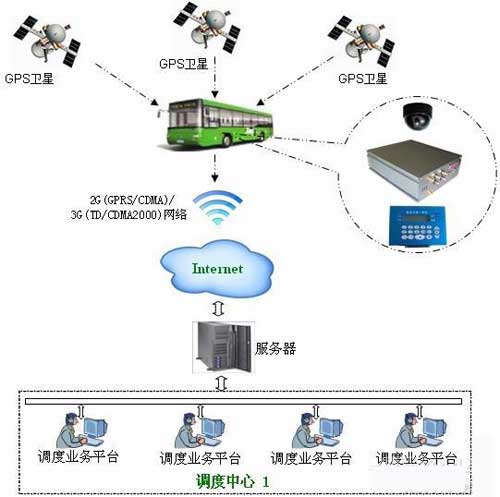The purpose of the intelligent public transport system is to technically implement the strategy of giving priority to the development of public transport through the technical transformation of the traditional public transport system with information technology, and to improve the service and management level of the public transport system. strive to occupy a large proportion of transport volume in urban passenger transport, achieve the efficient use of urban land space resources and energy, and ensure the safe operation of the system.
Provide high-quality passenger services.

New problems in urban public transport safety are highlighted.
Looking back on the sixty years since the founding of the people's Republic of China, the safety conditions of urban public transport in China have undergone earth-shaking changes, and the situation of urban public transport safety has been greatly improved.
With the help of science and technology, we have applied new technologies such as GPS positioning, GIS geographic information, wireless communication and network to public transport safety management, and gradually realized the management functions such as intelligent dispatching, security control and automatic positioning station announcement, which effectively improved the service level and safety performance of public transportation.
For example, the situation of getting on and off passengers is observed through the monitor, which avoids the accident of car door clamping caused by unclear observation.
However, with the rapid expansion of the scale of urban public transport, we continue to encounter new problems while solving old problems, which perplexes our traffic safety.
First of all, in most cities in China, the growth rate of motor vehicles is much higher than the speed of traffic infrastructure construction, which leads to the first problem is the high degree of traffic congestion.
In this case, once public transport safety is affected by emergencies, personnel evacuation and rescue are relatively difficult, improper disposal will result in huge personal and property losses, which will have a significant impact on social economy and life.
For example, a fire broke out on Shanghai bus 842 on May 5, 2008, killing 3 people and injuring 12 others; July 21, 2008.
Two bus explosions in Kunming, 2 people were killed and 14 injured; June 5, 2009, Chengdu No. 9 bus arson, 27 people were killed and 74 injured, etc. All prove that we still have a long way to go in building public transport safety.
Secondly, the public security situation on the bus is still grim.
The most common cases on buses are pickpocketing and robbery. although the police have taken a lot of measures, it is difficult to find witness after the case of pickpocketing and robbery on vehicles, and it is often difficult to testify, arrest and convict. Therefore, in fact, it is still unable to effectively contain the thieves.
At this stage, from a certain point of view, whether public communication is safe or not has become a barometer for the general public to measure the quality of urban law and order.
Thirdly, disputes between passengers and operators continue to occur all over the country due to ticket evasion, service attitude and other problems.
Once there is a dispute scene, it is difficult to obtain evidence, it is easy to form a situation of different opinions.
At the same time, buses are prone to occur in the course of operation.
The phenomenon that passengers steal ticket money and steal public funds as their own brings losses to bus companies.
Finally, how to supervise whether the driver is standardized or not.
How to grasp the changes of passenger flow in real time, in order to dispatch vehicle capacity in time, so as to obtain the best operational efficiency.
These are also thorny problems encountered by bus company managers on a daily basis.
In addition, with the social economy.
With the development of economy, the number of motor vehicles shows a growing trend, the number of gas stations and car stations is also increasing, the geographical location of gas stations and car stations are scattered, there are many outlets, there are some difficulties in management and monitoring.
A case study of Intelligent Public Transportation Technology.
In view of the above situation, domestic passenger transport departments are actively looking for solutions, and continue to use scientific and technological means to improve the current situation of public transport safety has become the consensus of all parties.
In this regard, the public transport video surveillance system jointly constructed by a bus company in Guizhou Province and China Unicom provides a positive reference for the construction of public transport safety in various places.
Using wireless network hemispheric devices.
In the aspect of in-vehicle monitoring, Unicom Divine Eye uses a wireless network hemispheric device, which can transmit the image in the car and the GPS data of the vehicle location to the wireless base station of the operator through the wireless network, and then transmit to the central management platform through the Internet.
The command and dispatch center can obtain the images and GPS data of all vehicles from the central management platform.
Users can also watch videos of any vehicle through their mobile phone.
By analyzing the GPS information of each vehicle collected by the central management platform, the estimated time for a specific vehicle to arrive at a certain platform can be calculated at any time.
This information is then transmitted through the wireless network to a specific electronic station sign unit, and the estimated arrival time of the nearest vehicle can be displayed on the LED display of each station.
According to the requirements of the bus company, technicians placed an explosion-proof infrared color wide-angle network hemispherical camera at the back of the driver to monitor the coin box and the driver's position.
In this way, we can check the driver's standard driving, passengers' coin investment and the appearance of passengers on the bus in real time, prevent theft and evasion of tickets, monitor the behavior of drivers and passengers to steal tickets, and provide video evidence for crew disputes at the same time.
In addition, the technician also placed an alarm button at the driving position. When the button is pressed in case of emergency, the monitoring center will receive an alarm prompt, and the monitoring personnel can learn about the situation of the vehicle by looking at the image of the car.
According to the need, the vehicle unit can also access the microphone and loudspeaker to realize the two-way intercom between the driver and the monitoring center.
Bus station monitoring.
In the aspect of the monitoring of the bus gas station, according to the actual situation on the spot and the monitoring of the bus station, Unicom Magic Eye designed to install a day-and-night intelligent low-speed ball camera (SN-WP580PT/18W) on the street lamp rack of each station according to the actual situation of the station and the needs of customers: the intelligent low-speed ball camera mainly monitors the activities near the station.
The network transmission equipment adopts Jingyang No.1 Network Video Server (SN- VSR5401).
The transmission network adopts wireless WCDMA network.
In terms of equipment power supply, all stations are powered by batteries, low-speed balls are powered by AC24 volt batteries, network video servers are powered by DC12 volt batteries, and special charging equipment is used to charge the batteries when the street lights are turned on at night to ensure that the equipment can work normally during the day.
Gas station monitoring.
Unicom Divine Eye is designed to install two day-and-night intelligent low-speed ball cameras (SN-WP580PT/18W) in the gas area and vehicle entrances and exits of each gas station; the intelligent low-speed ball cameras mainly monitor the activities of the internal gas area of the gas station, the network transmission equipment uses Jingyang four-way network video server (SN-VSR5404), 2-way standby; the transmission network uses Unicom 2m broadband.
The equipment of each business network is powered by 220V AC power supply.
Parking lot monitoring.
Deploy the bus parking lot monitoring system.
Unicom Divine Eye installs a day-and-night intelligent low-speed ball camera (SN-WP580PT/18W) in each parking lot of the bus company, which is mainly used to monitor the internal activities of the whole parking lot; the network transmission equipment adopts Jingyang Road Network Video Server (SN-VSR5401); and the transmission network adopts Unicom 2m broadband.
The system consists of two parts: the front-end monitoring equipment of each parking lot and the remote monitoring center.
Among them, each parking lot accesses the image of each camera to the local DVS (that is, the network video server), digitally compresses the analog image through DVS, and then uploads the analog image to the remote monitoring center through special line or broadband network; the remote monitoring center is equipped with a certain number of monitoring and management computers to perform monitoring, video recording, management and other functions.

 Manager Wang
Manager Wang
 OfficialAccounts
OfficialAccounts